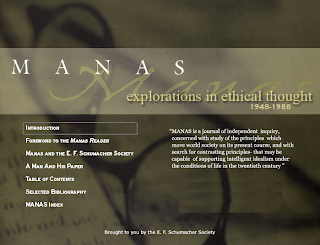Spinoza's principe (volgens Henry Geiger)
 Van 1948 tot december 1988 publiceerde Henry Geiger een filosofisch weekblad van acht pagina’s, MANAS, dat hij in overwegende mate zelf volschreef, maar waarin hij ook andere schrijvers (o.a. E. F. Schumacher) uitnodigde. Het bevatte essays, boekbesprekingen, columns waarin de menselijke bestaansomstandigheden centraal stonden vanuit een zeker globaal ethisch perspectief. Met behulp van de E. F. Schumacher Society zijn alle nummers op internet geplaatst. Zie hier.
Van 1948 tot december 1988 publiceerde Henry Geiger een filosofisch weekblad van acht pagina’s, MANAS, dat hij in overwegende mate zelf volschreef, maar waarin hij ook andere schrijvers (o.a. E. F. Schumacher) uitnodigde. Het bevatte essays, boekbesprekingen, columns waarin de menselijke bestaansomstandigheden centraal stonden vanuit een zeker globaal ethisch perspectief. Met behulp van de E. F. Schumacher Society zijn alle nummers op internet geplaatst. Zie hier.
Het is aardig om te zien hoe ook serieus aandacht aan Spinoza gegeven werd. Als je in het zoekvenster Spinoza ingeeft, krijg je bijvoorbeeld een special: MEN WITH IDEAS: SPINOZA [Manas, VOLUME III, NO. 11 - MARCH 15, 1950 - PDF]
Iets minder vind ik dan wel weer te lezen dat hij de leider was van de Theosofische Loge in Los Angeles, zodat enig zweven hem wellicht redelijk afgegaan zal zijn. Maar goed...Nadat in een ander nummer onder de titel THE PATHS OF REASON een review van de verzameling kritische en interpreterende essays in Paul Kashap (Ed.): Studies in Spinoza. [University of California Press, 1972] werd gegeven, volgt dan weer een commentaar onder de titel SPINOZA’S PRINCIPLE. Dit laatste neem ik hieronder graag over.
SPINOZA'S PRINCIPLE
THE value of studying Spinoza (see Review) becomes evident in the work of those who use his ideas to illuminate the course of human action. In what may be his most philosophical paper, "Fusions of Facts and Values" (in Farther Reaches of Human Nature), A. H. Maslow proposes that the "facts" of life are not morally neutral, but have implicit instruction in the way things ought to be and what one ought to do. As he puts it:"Because healthier, more perceptive people are less ought-blind—because they can let themselves perceive what the facts wish, what they call for, what they demand or beg for—because they can therefore permit themselves to be Taoistically guided by the facts—they will therefore have less trouble with all value decisions that rest in the nature of reality, or that are part of the nature of reality. . . .
"Pure" value-free description is, among other things,. simply sloppy description. . . . One finds what is right for oneself by listening carefully and Taoistically to one's inner voices, by listening in order to let oneself be molded, guided, directed. The good psychotherapist helps his patient in the same way—by helping the patient hear his drowned-out inner voices, the weak commands of his own nature on the Spinozistic principle that true freedom consists of accepting and loving the inevitable, the nature of reality.This also is modern phrasing of the old Socratic doctrine that no man with full knowledge could ever do evil. While we cannot go that far since we now know of sources of evil behavior other than ignorance, still we can agree with Socrates that ignorance of the facts is a major source of evil behavior. This is the same as saying that the facts themselves carry, within their own nature, suggestions about what ought to be done with them."
Maslow is saying that an actual grasp of the nature of things makes right or harmonious action the natural thing to do. Spinoza's free human being is Maslow's self-actualizing human being, and Socrates' man of philosophical understanding. Good decisions are for him part of the natural flow of his life—no big "moral struggle."Spinoza's point is that the truly free man simply knows what to do. As various philosophers have said, Freedom is knowledge of necessity, and the ideal of what we call morality is the spontaneous behavior of the individual who has this knowledge and accepts and loves "the inevitable."
Uit: MANAS Volume XXX, No. 15 April 13, 1977 - PDF

